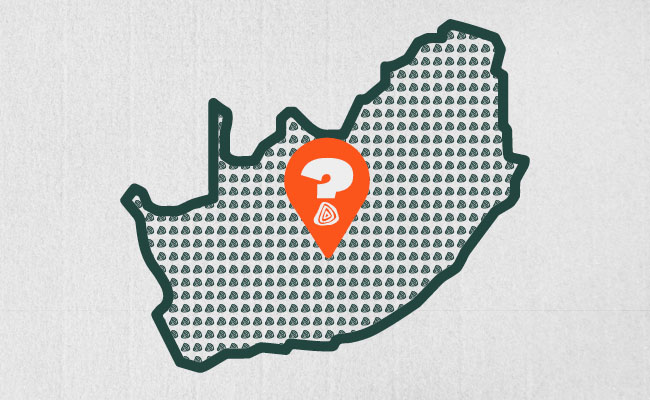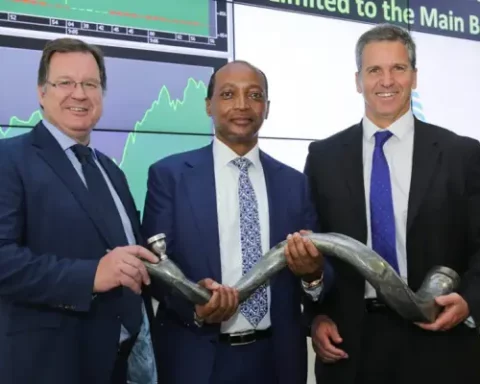There was a lighter moment at the Joburg Mining Indaba last week that was deeply illustrative of the angst in South Africa over Anglo American’s future.
Speaking about the group’s decision to slim down, while shedding its iconic local entities Anglo American Platinum (Amplats) and diamond arm De Beers, veteran miner Bernard Swanepoel asked Duncan Wanblad, the group’s CEO, how South Africa will adjust to this new dynamic.
“The Anglo American left in South Africa will no longer be the overriding evil face of mining and capitalism on the one hand and, on the other hand, this big force which has to be taken seriously,” he said. “I really do wonder about life after this.”
Wanblad gave the sort of diplomatic answer you’d expect of someone who had just barely survived a bruising takeover battle from Anglo’s larger rival, BHP, and has been forced into making decisions far faster, and far more brutal, than he’d have otherwise liked.
“I’m absolutely certain it will feel different for a while, but the adjustment will happen. I certainly don’t think the role Anglo will play will be any less significant in terms of its convening power and its will and ability to work with industry and the government,” he said.
Swanepoel joked that it was a pity he was now too old to work in the industry without “you damn guys around calling all the shots”.
Wanblad, with the sort of polite stiff upper lip that would be much admired in the brasseries around Anglo’s Charterhouse Street headquarters in London, responded: “Well, thanks for that Bernard, that’s very helpful.”
Swanepoel was never going to let him get away with that. “Very helpful? You know, this guy grew up as an engineer in South Africa, now he tells me to piss off in the most English way possible.”
Wanblad shot back: “Ek kan dit ook in Afrikaans sê as jy wil?”
Portfolio weakness
It was lively banter – Swanepoel remarked on the crowd Wanblad had drawn, saying “not all the people in the audience are Anglo employees. I mean, a lot of them are, but not all of them” – but it betrayed the anomie of a corporate sector grappling with the loss of a parent figure.
Anglo, after all, has been in the thick of it for 107 years. Formed in 1917 by Ernest Oppenheimer, its history is synonymous with that of modern South Africa: first, feral opportunistic exploitation, then the dark days of migrant labour, apartheid, and the growing revelation that this system would throttle its business. It was Anglo American that facilitated talks with the exiled ANC in Zambia, and PW Botha’s National Party.
Which isn’t to say that Anglo was a fierce lobbyist for change. Harry Oppenheimer, chair of Anglo between 1957 and 1982, later conceded that his company “didn’t do as much as we should have” to battle apartheid.
Michael Cardo, in his book on Oppenheimer, wrote that critics looked upon the riches Anglo made between 1957 and 1982 (combined after-tax profits of R13.3bn) with cynicism, pointing out that “three key institutions of apartheid – migrant labour, pass laws and the compound system – kept Anglo’s argosy afloat”.
But, then, partly because Anglo was such a behemoth, as Swanepoel points out, it did have outsize influence in the country’s economy. In the 1980s, with capital corralled in South Africa and unable to expand globally due to apartheid, Anglo simply bought up every other company. Paper company Mondi, sugar company Tongaat Hulett, Times Media, and even banking group FNB soared thanks to Anglo’s benevolence.
Then, in 1998, four years after democracy, it shifted its HQ to London, and became distinctly less South African, even as a globalised economy meant other mining firms could compete just as vigorously in South Africa – which they did.
BHP’s takeover of £39bn, launched in April then swiftly withdrawn on May 31, was a reflection of both Anglo’s portfolio weakness (with diamond and platinum prices being squeezed), as well as a discount on its share price because of its South African assets.
While analysts will say Anglo doesn’t need South Africa, it was precisely this connection that helped it defend itself against BHP: the realisation that the local competition regulator would have the final word, and that this watchdog would consider the “public interest” in assessing the bid, was a contributor factor in BHP walking away.
So the fact that Wanblad stuck doggedly to his script last week – repeatedly reinforcing that South Africa is Anglo’s home – was about more than just sentiment. Like its decision to help facilitate the discussions in Zambia to dismantle apartheid, this is good business.
“South Africa is the heart of our identity, and once we have simplified this portfolio, South Africa will still account for something like 30% of the value of this portfolio,” Wanblad said.
It was a message of sentiment, but one of strategy too: he was, of course, speaking to South Africa’s dealmakers and mining executives at a time the company is looking to offload assets. Creating the impression that you’ll take any price is never helpful for a seller.
Keeping government onside
“Duncan pushes this narrative repeatedly, but he does it to keep the government happy because the industry is so tied up in policy and regulations,” says Peter Major, a veteran mining analyst. “Look, South Africa is still very important – Kumba, Amplats and Venetia are huge, important parts of its business – but Anglo in South Africa is not anywhere as significant as it was.”
In the 1980s, Major says Anglo accounted for more than half the platinum group metals, gold and manganese produced in the country, and 95% of the diamonds. Today, it has sold out of gold entirely, and its influence has vastly diminished in those other commodities.
He says the Anglo created by Ernest Oppenheimer, which solidified its national and global reputation under Harry, is long gone. In the democratic era, he says, the government implemented a range of new policies and laws which ensured the company could only ever make incremental progress after that, with its success relative to its peers hinging more and more on its international portfolio mix.
“Duncan realises only too well the importance of keeping the government onside, especially given how its good relationship helped protect it during the BHP bid,” he says.
A turn to copper
In the 1990s, almost every decision on the JSE was sense-checked on the palatial executive floors at 44 Main Street, where the company set up camp in 1939; today, Anglo has shifted its headquarters to the trendy business district of Rosebank, where it is just one of many anonymous glass-fronted edifices housing private equity firms and boutique coffee shops.
It wouldn’t be true to say Anglo doesn’t matter, but it certainly doesn’t matter that much. It no longer has the casting vote it once did.
For local investors, Anglo remains important. It is a staple in many South African pension funds – the Public Investment Corporation still owns 8% of it – so Wanblad’s Anglo was always under pressure to respond to shifting commodity price expectations, to continue to make money for its investors.
“It is just no longer acceptable for our shareholders to carry the resulting discount that emanates from that complexity,” Wanblad said.
So what will Anglo look like in its new incarnation? Mostly copper – 60% of its revenue will come from this clean energy metal, which is expected to see sharp growth based on its use in green-focused infrastructure plans.
Last week, BHP chief commercial officer Ragnar Udd said that, over the next few decades, “we see a 70% surge in global copper demand to 50Mt annually”, driven by copper’s role in new technologies, and in the world’s decarbonisation aspirations. Latin America, Africa and the Asia-Pacific region are likely to be pivotal in meeting this demand, BHP said.
This is why Wanblad said that Anglo’s remaining businesses – copper, iron ore and the fertiliser business Woodsmith – would provide “a very compelling option on what the world is desperately going to need for decades to come”.
This illustrates that, other than Kumba Iron Ore, which remains a definitive presence in the Northern Cape around Sishen, much of Anglo’s future lies in the copper fields of Peru and Chile. As much as Wanblad might not want this to be true, Collahuasi, Quellaveco, Los Bronces and El Soldado are what Kimberley and the Highveld used to represent to Anglo American.










